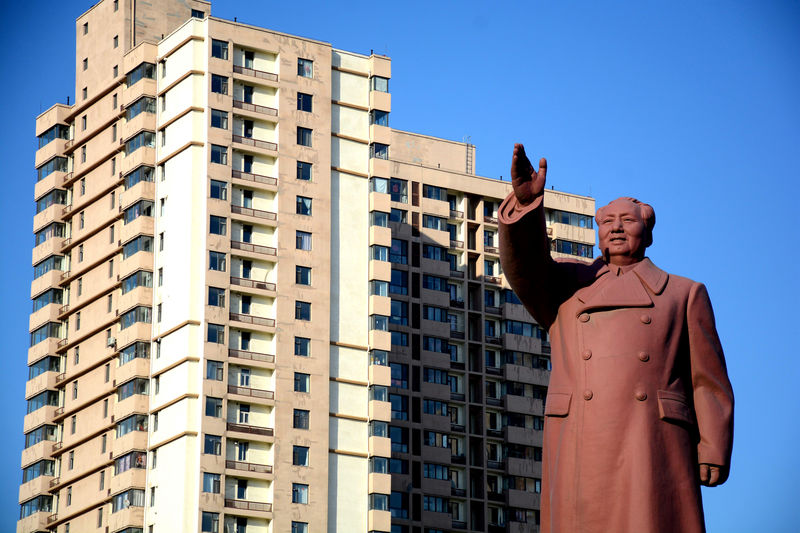BEIJING (Reuters) - New home prices in China grew at a solid pace in April as Beijing sought to boost economic activity in the face of an escalating trade war with the United States, though potential bubble risks may prompt some cities to tighten policies.
Beijing has repeatedly called on local governments to take more responsibility in keeping the frothy market under control. But pent-up demand for housing, easier credit conditions and some local governments relaxing purchase restrictions may be further fanning price gains in a market where fear of missing out is strong.
Average new home prices in China's 70 major cities rose 0.6% in April, unchanged from the pace of growth in March, according to Reuters calculation of data released by the National Bureau of Statistics (NBS) on Thursday.
On the whole, it logged the 48th straight month of price increases. Most of the 70 cities surveyed by the NBS still reported monthly price increases for new homes, and the number was up to 67 from 65 in March, signaling broadening strength in the market.
On an annual basis, home prices rose 10.7% in April, picking up from a 10.6% gain in March.
"The impact of a series of cuts in banks' required reserve ratio (RRR) on the property market is showing," said Zhang Dawei, an analyst with property consultancy Centaline. China has announced five RRR cuts in the past year with another targeted reduction focused on small and medium-sized banks earlier in May.
The government has been walking a tightrope between maintaining economic growth and cracking down on a potential housing bubble, amid weakening exports and sluggish consumer demand.
Chinese banks throttled back new lending in April after a record first quarter that sparked fears of more bad loans, but the central bank is widely expected to roll out more measures to support the economy after an unexpected flare-up in trade tensions with the United States earlier this month.
Data on Wednesday showed while property investment was resilient in April as developers rushed to boost their land inventories in the wake of looser credit and purchasing rules, demand for new homes remained weak in a reflection of the broader economic slowdown.
Authorities appear keen to avoid dealing a sharp knock to the real estate market as it directly influences 40 other business sectors in China and is key to maintaining financial stability and tempering the economic slowdown.
The solid home price growth contrasts with surprisingly weak April retail sales and industrial output data, adding pressure on Beijing to roll out more stimulus as the trade war with the United States escalates.
OVERHEATING?
But the government's push for banks to step up support for struggling smaller companies and shore up the economy could actually work against its pledge to flush out property speculators.
Medium- to long-term new household loans, mostly mortgages, totaled 416.5 billion yuan ($60.6 billion) in April, according to central bank data, down slightly from 460.5 billion yuan in the previous month but still remained elevated.
Most of the price gains appeared to have been driven by growth in China's four top-tier cities - Beijing, Shanghai, Shenzhen and Guangzhou. Collectively, they rose 0.6% from a month earlier, quickening from a 0.2% gain in March, the statistics bureau said in a statement accompanying the data.
Tier-2 cities, which include most of the larger provincial capitals, also posted gains. They increased 0.8% in April on a monthly basis, compared with the 0.6% gain in the previous month.
In smaller tier-3 cities, they rose 0.5%, easing from 0.7% in March, the statistics bureau said.
Qinhuangdao, a small port city on the coast of China in northeastern Hebei province, was the top price performer in the month, with its prices increasing 1.8% on a monthly basis.
Previously, some smaller cities had quietly loosened curbs to prop up sentiment and demand. Moody's said last month that regulatory measures were unlikely to be loosened further amid strong growth in Chinese property prices, which it expects will slow during the remainder of 2019.
In fact, some cities have started to implement additional curbs on signs of overheating.
While some market watchers speculate Beijing will be forced to roll out more stimulus due to a slowing economy, Centaline's Zhang said the government is unlikely to allow unfettered gains in the property market.

"The market can enter a warm 'spring' but it's impossible that the government will let it enter a full-swing summer."